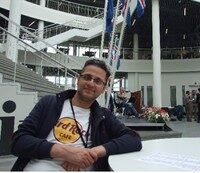
- This event has passed.
Quantum Computing in Mullingar
Date: Tuesday, September 12th, at 7 pm
Location
Idaso Ltd Head Office,
Unit 18,
Mullingar Business Park Clonmore,
Mullingar
Co Westmeath,
N91 K124
MIT Mullingar is delighted to introduce Mehrdad Maleki as our upcoming guest speaker. Join us as Mehrdad delves into the fascinating realm of Quantum Computing on Tuesday, September 12th, at 7 pm in Mullingar. This gathering promises to be a valuable experience for IT professionals and students eager to explore the potential of this groundbreaking technology.
We extend our gratitude to Idaso, who generously offered their Mullingar office as the venue for this event and will graciously provide tea, coffee, and refreshments. To secure your spot at this informative event, please send an email to [email protected] or message us via LinkedIn or WhatsApp, and we’ll include you on our guest list.
About Mehrdad

As a Leading R&D Researcher in Quantum Computing, Mehrdad Maleki harnesses his deep expertise in computer science and mathematics to propel innovation and drive forward research within the dynamic realm of quantum computing. Boasting a formidable foundation in both of these domains, including a notable postdoctoral research fellowship in computer science at Maynooth University, where he focused on the intricacies of Automatic Differentiation, Mehrdad specializes in the intricate art of algorithm design for Quantum Computing and Quantum Information. His expertise extends to encompass Nonlinear Optimization, Crafting Programming Languages, Compiler-Interpreter Design, Exploring Dynamical Systems, Delving into Classical Mechanics, Mastering Control Theory, and Navigating the complexities of Differential Geometry. What sets Mehrdad apart is his exceptional ability to discern the intricate connections that thread through mathematics, computer science, physics, and logic. This unique talent empowers him to construct bridges between these diverse disciplines and, in doing so, propel the boundaries of what is achievable in these fields.
About Quantum Computing
Quantum computing is a cutting-edge technology that harnesses the principles of quantum mechanics to perform complex calculations at speeds unimaginable with classical computers. Unlike traditional bits that can be either 0 or 1, quantum bits or qubits can exist in multiple states simultaneously, thanks to superposition. This property allows quantum computers to explore multiple solutions in parallel, making them exceptionally powerful for tasks such as factoring large numbers, simulating quantum systems, and optimizing complex problems. While still in the early stages of development, quantum computing holds the promise of revolutionizing industries like cryptography, materials science, and artificial intelligence by tackling problems that were once thought to be insurmountable for classical computers.
